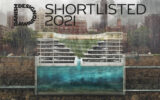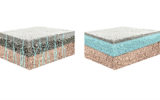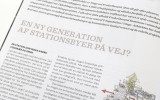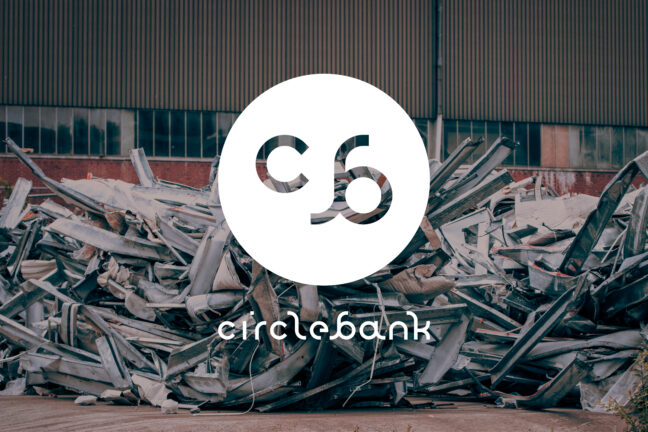
Grand Solution awarded to Circle Bank, a new platform that seeks to outperform linear construction by 2030. By 2030, circular construction has overtaken linear construction in competitiveness. This is the message from leading players in circular construction and digitalisation, who have just received a large investment home in Circle Bank – a new ambitious project collaboration.
Circle Bank is a three-year project under Grand Solutions and the goal is to create a united digital platform that can accelerate circular construction. With a total budget of EUR 2,7 million and a funding of EUR 1.7 million from Innovation Fund Denmark and Realdania, the consortium has embarked on the three-year journey to support the construction players in the transition to a competitive circular economy.
“We need a tool that can ensure we make decisions about circular construction on an informed basis and ensure our ambition to implement as sustainable buildings as possible can be fulfilled,” says Robert Nellemann from Danica Real Estate, who is one of the partners in the project and one of the country’s largest private builders.
He is backed by Flemming Rafn from the architectural studio Third Nature, who is also participating in the ambitious project,
“Today, it is difficult to reuse building materials on a large scale, because we do not have a handle on where the materials are located, what condition they are in and what we can use them for,” Flemming Rafn adds.
And this requires new solutions, even if you ask Jesper Kort Andersen, Project Director at Lejerbo, who adds, “Today, construction is in dire need of new solutions that can push the industry in a greener and more sustainable direction. Used building materials play a key role here and therefore it is important that we develop new tools that can streamline processes and help improve the quality of construction.”
The construction sector must be part of the solution.
Overall, construction accounts for almost 40% of global CO2-emissions, while production, transport and waste generation and management in the construction sector account for 11% of global emissions of climate gases. It is this part of the building footprint that the Circle Bank project focuses on.
In addition to CO2-emissions, construction is a major consumer of virgin materials made from scarce resources. By reusing existing building materials, the project also helps ensure a lower impact on the planet’s resources. At the same time, the project has an ambition to help reduce the amount of waste in the construction sector, which is otherwise expected to increase to more than 2.2 billion tons CO2-emissions globally by 2025.
Linear construction is cheapest – a little while longer.
From the Danish Technological Institute, where Katrine Hauge Smith is project manager for the large-scale project, the announcement is that today it is often both cheaper and easier to build with virgin materials, but it will not continue.
“As requirements and objectives are introduced to reduce CO2-emissions, as we have just seen with the new political agreement on sustainable construction, where resource consumption from construction is also in focus, then it is only a matter of time before the circular economy becomes competitive. With the new requirements for handling construction waste, which the industry is also met with, it will be crucial to be able to use recycled materials in the construction,” stresses Katrine Hauge Smith, who looks forward to helping the construction sector with the necessary circular transition.
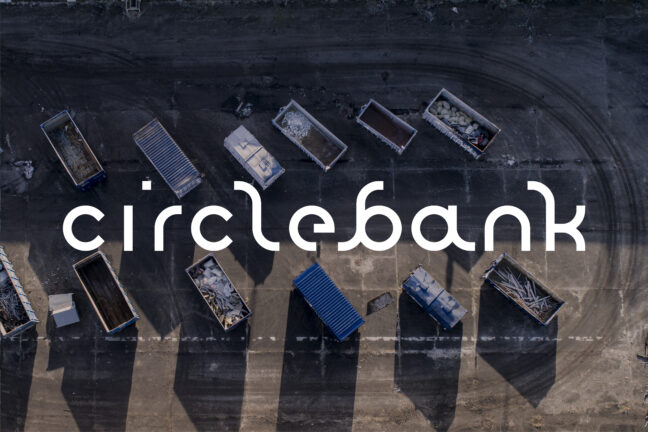
Based on existing experience
The goal of the Circle Bank project is to build on the good experiences and many interesting experiments around circular construction that have seen the light of day over the past decade. By complementing new research and integrating with existing tools and processes in the industry, the consortium behind Circle Bank will build a digital platform to be the circular construction industry’s preferred collaboration platform.
“With Circle Bank, we will in gather available knowledge about circular construction in one digital decision support tool, where we can simultaneously track and trade the materials,” says Thomas Fabian Delman, Ceo of CB Nordic, who will develop and operate the new digital platform.
Jens Hørby Jensen, owner of the Jensen Group and chairman of CB Nordic’s board of directors, adds,
“With Circle Bank, we optimise at all stages of the value chain and reduce the cost of building circularly.”
When falling costs in circular construction meet the rising costs of linear construction, the consortium behind Circle Bank expects the construction industry to change course in a more sustainable direction.
“We hope that the entire industry will support the project. It requires a determined effort and a unified platform if we are to fulfil the construction’s share of the Paris agreement, concludes Lene Brix, chair of the project steering committee.
Facts /details
Follow the progress of Circle Bank at circlebank.dk
For further information, please contact:
- Lene Brix, Chair of the Circle Bank Steering Committee, lene@matter-bybrix.dk, +45 5124 9794
- Thomas Fabian Delman, CEO, CB Nordic ApS, tfd@circlebank.dk, +45 3029 5776
- Katrine Hauge Smith, Senior Consultant / Project Manager, Danish Technological Institute, khs@teknologisk.dk, +45 7220 1404
- Jakob Dahl Wedel, Scientific Officer, Innovation Fund Denmark, wedel@innofond.dk, +45 6190 5031, sks@realdania.dk
- Simon Kofod-Svendsen, Project Manager, Realdania, sks@realdania.dk, +45 2094 8995
About Circle Bank
Circle Bank is a Grand Solution project that aims to invite the building sector into a unified digital platform that integrates new knowledge within scanning, demolition, material handling and architectural design. Circle Bank’s ambition is to create a decision support tool and a market platform that supports circular construction in Denmark as well as internationally. The project is supported by Innovation Fund Denmark and Realdania through a collaboration that aims to support research and development projects for the construction sector’s transition to circular resource economy.
Commercial partners of the project
CB Nordic ApS is founded to ensure that the knowledge created in the project can be lifted into the market for the benefit of the construction players. The company is jointly owned by the commercial players of the Circle Bank project.
Contact: Thomas Fabian Delman, Ceo, tfd@circlebank.dk, +45 3029 5776
Third Nature is an architectural office that creates regenerative cities and develops scalable climate solutions for the city’s green transformation.
Contact: Flemming Rafn, co-founder and partner, fr@tredjenatur.dk, +45 4093 4309, frt@tredjenatur.dk
Matter bybrix is an architectural company that advises public and private clients in circular development and strategic processes within the built environment.
Contact: Lene Brix, CEO, lene@matter-bybrix.dk, +45 51249794
Jensen Demolition A/S is a leading Danish demolition and environmental redevelopment contractor, which through innovative methods specializes in the recycling and recycling of building materials.
Contact: Thomas Sinding, Head of Development, tsi@j-jensen.com, +45 60 12 81 83
HD Lab is a technology company that tries to solve some of the challenges of the construction industry through new approaches, collaboration, and efficient use of technology.
Contact: Rolf Büchmann-Slorup, COO & Partner, rbs@hdlab.dk, 31320298
Twentyfifty is a strategic advisor focusing on innovation processes & business development in the circular economy and green transition.
Contact: Thomas Fabian Delman, CEO, tfd@twentyfifty.dk, +45 3029 5776
The project’s knowledge partners
The Danish Technological Institute, Construction & Construction represents Denmark’s largest concentration of knowledge about building materials.
Contact: Katrine Hauge Smith, Senior Consultant (Project Manager), khs@teknologisk.dk
SDU Life Cycle Engineering, the University of Southern Denmark delivers quantitative sustainability assessments and communication.
Contact: Morten Birkved, Professor (MSO) and Head of Centre, morb@igt.sdu.dk
The project’s market partners
Danica Real Estate invests in real estate to ensure a good and secure return for pension customers’ savings. Danica’s property portfolio is one of Denmark’s largest.
Contact: Robert V. S. Nellemann, Head of Property Development, rnel@danicapension.dk
Lejerbo is one of Denmark’s largest public administration organization with housing distributed throughout most of the country.
Contact: Jesper Kort Andersen, Project Manager, JEA@lejerbo.dk
Middelfart Municipality is a green growth municipality where the focus on climate, sustainability and Circular Economy is a cornerstone of its ongoing development.
Contact: Tine Veng Basse, Project Manager at Middelfart Municipality, Tine.VengBasse@middelfart.dk
Roskilde Municipality contributes to circular conversion of construction through partnerships, market dialogue and binding strategies focusing on recycling and sustainability.
Contact: Klaus Kellermann, Client Advisor and Sustainability Architect at Roskilde Municipality, klauske@roskilde.dk


